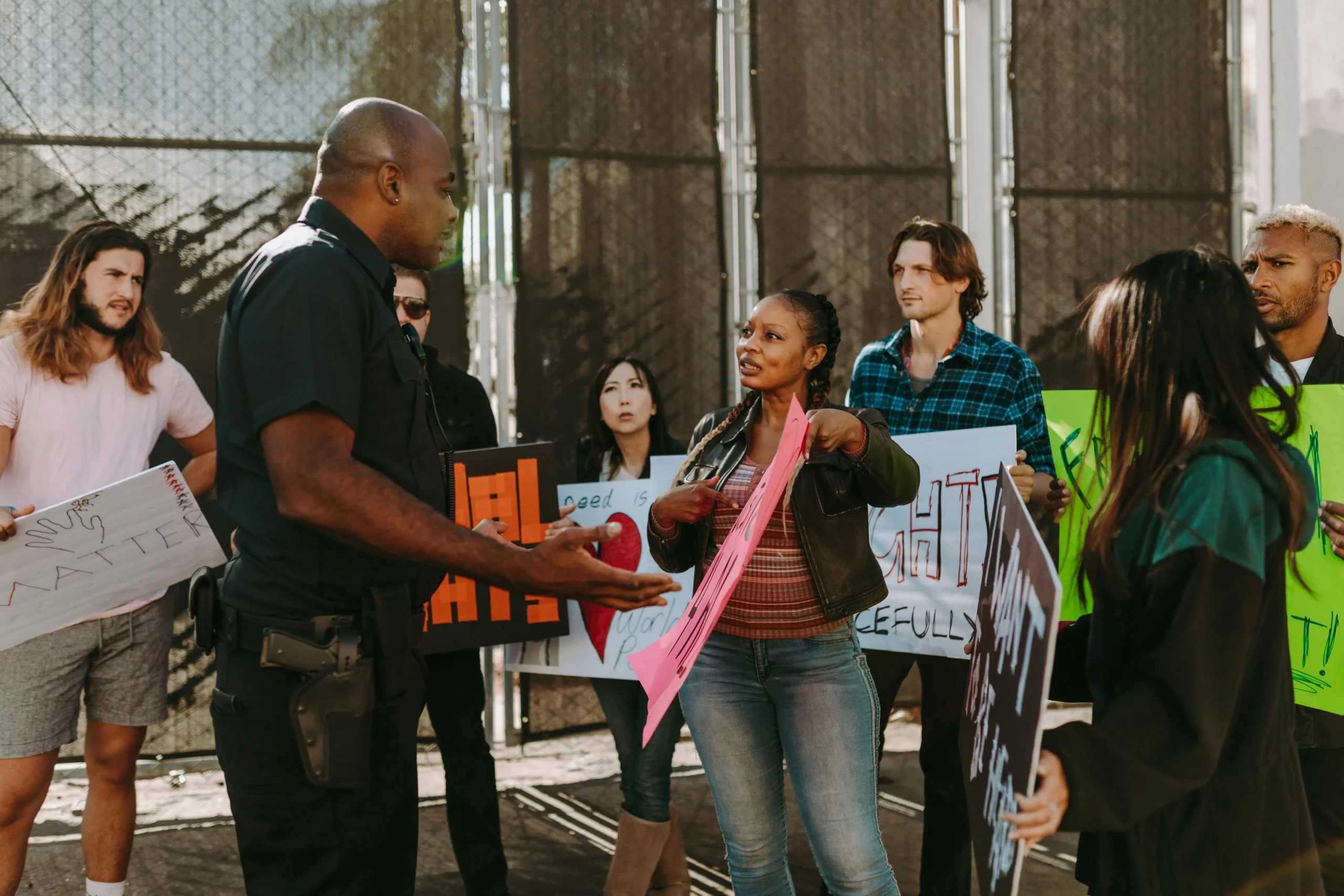Why You Need a Civil Rights Lawyer
When your fundamental rights are violated, the system often feels stacked against you. A civil rights lawyer serves as your legal warrior—fighting discrimination, challenging systemic injustice, and holding powerful entities accountable.
This comprehensive guide covers 20 critical civil rights topics, from workplace discrimination to digital privacy, giving you the knowledge to stand up for your rights effectively.
1. Workplace Discrimination and Civil Rights Violations
When Bias Affects Your Livelihood
A civil rights lawyer can help with:
- Racial/gender pay disparities
- Age discrimination (40+)
- Pregnancy discrimination
- Religious accommodation denials
Recent Win: Secured $1.2M for Muslim worker denied prayer breaks.
2. Police Brutality and Misconduct Cases
Holding Law Enforcement Accountable
Common claims:
✔ Excessive force
✔ False arrests
✔ Racial profiling
✔ Illegal searches
Critical Evidence: Bodycam footage, witness videos, and medical reports.
3. Voting Rights and Election Laws
Protecting Your Democratic Voice
Current battles:
- Voter ID restrictions
- Polling place closures
- Gerrymandering challenges
- Mail-in ballot disputes
2024 Alert: 14 states have new voting laws affecting access.
4. LGBTQ+ Rights and Legal Protections
From Marriage Equality to Workplace Fairness
Landmark protections:
- Obergefell (marriage equality)
- Bostock (workplace discrimination)
- State-level conversion therapy bans
Ongoing Fight: 28 states lack comprehensive LGBTQ+ nondiscrimination laws.
5. Disability Rights and ADA Compliance
Ensuring Equal Access
Common ADA violations:
- Inaccessible websites
- Lack of wheelchair ramps
- Service animal refusals
- Employment discrimination
Did You Know? ADA lawsuits increased 300% since 2013.
6. Free Speech and First Amendment Cases
When Expression Is Punished
Protected speech includes:
- Protest participation
- Artistic expression
- Social media posts
- Whistleblowing
Recent Case: Student won $90K after suspension for anti-war poem.
7. Housing Discrimination and Fair Housing Laws
Your Right to Equal Treatment
Illegal practices:
- Steering minorities to certain areas
- Rejecting Section 8 vouchers
- Disparate rental terms
- Harassment by landlords
Shocking Stat: 60% of discrimination complaints involve disability.
8. Racial Discrimination and Civil Rights Law
Systemic Racism in Court
Legal tools:
- Title VII (employment)
- Fair Housing Act
- Section 1981 (contracts)
- Section 1983 (government abuse)
Powerful Example: Won $3M settlement for racially targeted traffic stops.
9. Gender Equality and Legal Protections
Breaking Workplace Barriers
Key laws:
- Title IX (education)
- Equal Pay Act
- Pregnancy Discrimination Act
- VAWA protections
Pay Gap Reality: Women still earn 82 cents per male dollar.
10. Religious Freedom and Legal Cases
Balancing Beliefs and Rights
Controversial areas:
- Workplace accommodations
- Healthcare refusal clauses
- Prison religious practices
- Zoning for houses of worship
Complex Case: Muslim inmate won right to grow ½-inch beard.
11. Prisoner Rights and Legal Advocacy
Constitutional Protections Inside
Common violations:
- Excessive solitary confinement
- Medical neglect
- Sexual assault by staff
- Retaliation for complaints
Success Story: Ended “no-touch” torture in state prison.
12. Wrongful Arrest and False Imprisonment
When Freedom Is Taken Illegally
Elements to prove:
- Lack of probable cause
- Malicious prosecution
- Violation of procedures
Compensation: Average settlements range 50K−50K−500K.
13. Hate Crimes and Civil Rights Prosecution
When Bias Turns Violent
Federal laws cover:
- Race/color
- Religion
- National origin
- Sexual orientation
2023 Data: 11,288 hate crimes reported (likely undercounted).
14. Whistleblower Protections and Retaliation
Speaking Truth to Power
Protected disclosures:
- Fraud against government
- Safety violations
- SEC violations
- Healthcare overbilling
Key Law: False Claims Act rewards can reach 30% of recovery.
15. Equal Pay and Wage Discrimination Cases
Closing the Pay Gap
Legal strategies:
- EEOC complaints
- Class action lawsuits
- State-level equal pay acts
Landmark Win: $250M settlement for female tech employees.
16. Government Surveillance and Privacy Rights
Big Brother Overreach
Constitutional limits:
- Warrantless tracking
- Bulk data collection
- Social media monitoring
- Facial recognition abuse
Recent Ruling: Police need warrants for cell location data.
17. Public Accommodations and Discrimination Laws
Equal Access to Services
Protected spaces:
- Restaurants/hotels
- Retail stores
- Theaters/stadiums
- Medical facilities
Current Issue: Website accessibility lawsuits surge.
18. Civil Rights Litigation Process Explained
From Complaint to Verdict
Key stages:
- EEOC/agency complaint
- Right-to-sue letter
- Federal court filing
- Discovery phase
- Settlement talks/trial
Timeline: Most cases take 2-4 years to resolve.
19. Civil Rights in the Digital Age
New Frontiers of Justice
Emerging issues:
- Algorithmic discrimination
- Online harassment
- Workplace surveillance
- Deepfake defamation
2024 Challenge: AI hiring tools showing racial/gender bias.
20. Choosing the Right Civil Rights Lawyer
5 Essential Questions
- “How many civil rights trials have you taken to verdict?”
- “What’s your success rate with [your specific issue]?”
- “Do you work on contingency or retainer?”
- “Who will handle my case day-to-day?”
- “Can you share comparable case results?”
Red Flag: Attorneys who guarantee specific outcomes.
FAQs: Civil Rights Lawyer
1. When should I contact a civil rights lawyer?
Immediately after any rights violation—statutes of limitations apply.
2. How much does a civil rights lawyer cost?
Many work on contingency (no upfront fees); others charge 250−250−500/hour.
3. What’s the difference between civil and criminal rights cases?
Civil suits seek compensation; criminal prosecutions punish offenders.
4. Can I sue for emotional distress in civil rights cases?
Yes—pain and suffering damages are common in successful claims.
5. How long do civil rights cases take?
1-3 years typically; complex class actions may take longer.
6. What evidence do I need for a discrimination case?
Emails, witness statements, comparative data, and documentation of incidents.
7. Can undocumented immigrants file civil rights claims?
Yes—constitutional protections apply regardless of status.
8. What’s the average settlement for police misconduct?
100K−100K−1M+ depending on injuries and egregiousness.
9. Are there caps on civil rights damages?
Some states limit certain damages (e.g., $300K for emotional distress).
10. How do I report civil rights violations?
EEOC (employment), DOJ (police), HUD (housing), or consult a lawyer first.
Conclusion: Stand Up for Your Rights
Civil rights aren’t abstract concepts—they’re living protections that require vigilant defense. A skilled civil rights lawyer transforms outrage into justice through the power of the law.
Take Action: Contact a top civil rights lawyer today to discuss your case.
“Facing rights violations? Share your story below or book a consultation with a civil rights attorney now!”
Learn more about other types of lawyers and their specializations : Types of Lawyers and Their Specializations: 20 Legal Specialties Explained


One thought on “Civil Rights Lawyer: Your Complete Guide to Justice and Equality”